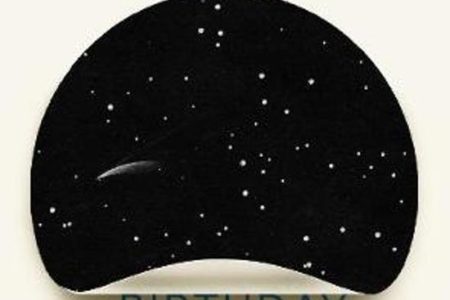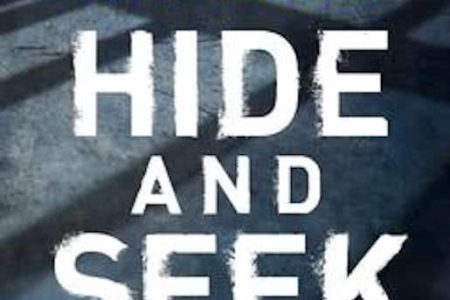In  case you missed it: Karin Slaughter has been touring our little country to promote her latest book, Pieces of her/Gespleten. Thrillers & More reached out to her (with help from her publisher, HarperCollins, thank you for that!) and asked her if she could somehow find the time to answer a few questions…and she did! Whoop! How cool is that! So keep on reading and find out just how many bodies she has hidden in her cabin in the mountains…
case you missed it: Karin Slaughter has been touring our little country to promote her latest book, Pieces of her/Gespleten. Thrillers & More reached out to her (with help from her publisher, HarperCollins, thank you for that!) and asked her if she could somehow find the time to answer a few questions…and she did! Whoop! How cool is that! So keep on reading and find out just how many bodies she has hidden in her cabin in the mountains…
What motivates you to write?
I have no idea. I’ve always written, since I was a little girl. When I first learned to hold a pencil I was always writing and drawing. It’s just something that has always come very naturally to me. I loved when I was a little girl to write little books and my dad gave me a quarter when I wrote a book. There were like 5 pages and I stapled them together – when I was allowed to play with the stapler – and that was just how I started.
Do you have certain dreams as an author?
I don’t know what dreams you have if you’re not an author. I do remember when I started writing Pretty girls I had the idea in a dream. I just hurt my back pretty badly and I was taking medication and I had never smoked a cigarette or been on drugs – it was the first time I’d been on a narcotic. It gave me this crazy dream. I wrote it down in the middle of the night and in the morning I looked at it and thought: ‘Wow, that would be a great opening for a book’. And that’s how Pretty girls came to me. That’s the only time that happened, and since I won’t be a drug addict, the last time it will ever happen.
How do you write? As in, do you have certain rituals? Do you just start writing and see where the story takes you, or do you write out the plot first?
When I’m ready to write – I have a cabin up in the North Georgia mountains – and I drive up to it. It takes about two hours. I don’t have any music on in the car – just silence – and I think about what I’m gonna write. But the process of preparing to write happens many months before that, when I’m thinking about the book and how it will feel and who the characters are… Just filling my head with this story. When I started writing Pieces of her I had that opening very firmly in my head – about Andy and her mother Laura and how that would work. The first line was something I knew I was gonna write months before I wrote it. I don’t really plot books, I just think about their overall shape. I kind of like to figure out the surprises and twists and turns as I go along. But I always know when I’m thinking about that first chapter, my goal before I write, is knowing what the last chapter will be like. Because I have to know how it ends, who the bad guy is and why this terrible thing happens. I’m very conscious that these sorts of crimes happen a lot. One of the reasons I love reading crime novels is because it explains why – why someone does a bad thing. And that’s what I try to do in my work.
 Where did the subject/plot for Pieces Of Her come from?
Where did the subject/plot for Pieces Of Her come from?
It started off with me just thinking about the differences for generations of women and how things have changed for us. My generation – we weren’t given a lot of messages about how we could succeed in life outside of getting married and having children. We weren’t expected to be really driven in our careers and it was considered a bad thing for women to be ambitious. Which is still considered that for a lot of women – which is why we don’t have a female president right now. I just thought it would be interesting to talk about the choices of Laura’s generation – which were very narrow – versus the choices of Andy’s generation – she has so much she could do that she can’t make a decision about anything.
Which one of your characters, out of all your books, is your favorite and why?
I’ve been writing about Sara Linton, for almost every book, except for the standalones. So Sara’s been in all of them. In Grant County and Will Trent – she’s been in those too – so I feel a real closeness to her. I really think that she’s a bit aspirational, cause she’s taller than me, she doesn’t get older, her knees don’t hurt, she’s really active and has a fantastic sex life – even though she’s been with the same guy for a long time – I think she’s an interesting character to write. But also there’s something I have to be aware of: women don’t like to read about perfect women. Guys love to read about Jack Reacher – who never has a problem – or Bosch – for Michael Connelly. The typical male character is very driven, very successful, he never sweats and never makes mistakes. But if you do that with a woman – people will hate her. She will be too accomplished. The trick with Sara is acknowledging that she’s a doctor, she’s owned her own business, she’s been very successful in work and she’s really smart. And then I have to have her have some flaws on top of that otherwise people would just not be interested in reading about her.
What do you like to read? Is there an author that you think of as your great example?
The one I admire the most in contemporary terms is Mo Hayder. She’s an exceptional writer. She’s very good at plotting crime novels. If someone asked me to teach a class on how to write a thriller I would probably take one of Mo’s books, because she’s just very good, very tight in her writing and she doesn’t flower up the language – every word seems specifically chosen, and that’s really hard to do. But I also admire Lee Child – I think it’s really interesting how he’s basically writing the same story over and over again and Reacher goes to a town and kicks a lot of ass and makes things right. But every one of them is interesting to me. I love the fact that Jack Reacher doesn’t look at women as the lesser sex; he’s always going to respect them and he fights side by side with them and listens to them. I happen to know Lee Child and he’s exactly like that. He’s a great feminist and supports women. He’s been so supportive of women in the crime writing community. He’s a great example for guys who wanna be successful.
Do you have plans for your next book? Will this be a new part in the Sara/Will series or a standalone?
The next book is definitely a Will and Sara-novel. I’ve already written the opening, Sara’s mother is there. I can’t tell you anything about it except that it has Will and Sara and bad things happen.
 What made you decide to join the Sara Linton and Will Trent series together?
What made you decide to join the Sara Linton and Will Trent series together?
There are a couple of reasons. The question that has to be addressed first is: why did I decide to end the Grant County-series. The short answer is that Sara and Jeffrey were too happy. You think you want to read about happy people – but they’re really boring. Part of the reason you read crime thrillers is you want to be shocked. I think everyone was really shocked when I ended Grant County that way. But it was a very deliberate thing. I knew when I wrote the third Grant County-novel that there were only gonna be six Grant County-novels. It just kind of was a choice I made that I want the books to feel realistic. And at a certain point you wonder why anyone lives in this town where all these horrible crimes happened. I knew I had to have a change and I knew when I wrote Triptych, which is the first novel that features Will Trent, that eventually he would meet Sara and I had to work on making him the kind of guy Sara would be interested in. So if you look at Will in Triptych or the next book Fractured, he’s changing. He’s opening up and moving away from Angie. He’s questioning what his life is like. Faith is there. Amanda is more of a presence. You see him kind of becoming the guy Sara would be interested in.
What do you like to do when you’re not writing?
I like to read a lot. I love reading, I’ve always loved reading. I think it’s important as an author to read because if you’re not reading than you’re not exercising really important parts of your brain. Even if you read a bad book you know why it’s bad – you’re examining character development or you’re doing what made you want to write in the first place; which is read a book and say: ‘Hey, I can do that! I wanna be better! I wanna be this good!’ And that to me is always very inspiring.
I like to go on my treadmill. I like to do things that have no relationship to writing. Play with my cat. Be outside. I love swimming – so I swim laps in the pool a lot. Anything that takes my mind of writing and gives me time to relax – I love doing that.
 Do you enjoy watching movies/series? If so, any recommendations?
Do you enjoy watching movies/series? If so, any recommendations?
I do love watching series. Breaking Bad was one of my favorites of all time. I also love The Americans, which just finished the last season. I thought it was terrific. I just love spy thrillers, basically. I also kind of enjoy silly shows like The Vampire Diaries, but I only let myself watch it when I’m on the treadmill. I’m finally on the last season which tells you I’m not on the treadmill enough. There’s a show on Netflix called Kimmy Schmidt, which is about a silly woman and her silly friends and it just makes me laugh all the time. I love shows like that.
How many bodies are hidden away in your log cabin?
Six.
Would you ever want to cowrite a book with someone? If so, who?
I don’t think I would want to do an entire book. I did do a short story with Michael Koryta, who’s an American author. We wrote a short story set in the 1980s and I wrote about Jeffrey Tolliver before he met Sara. That was a lot of fun but also a lot of work – we’re very different writers. I’ve spoken for many years to Lee Child about writing a book where Jack Reacher meets Will Trent. Maybe one day we’ll do that – a short story or something.
 Lately you’ve been writing more standalones, has that been a conscious decision?
Lately you’ve been writing more standalones, has that been a conscious decision?
Well yes and no. Because I love writing Will and Sara-books, and I want to make sure that when I write a story about them, that it’s a good story – that says something about the relationship and where they are in the world. And their jobs and how they’re navigating all that together. There was something of a cliffhanger at the end of The Kept Woman as to whether or not they would get back together. So I wanted to make sure that when I wrote the next book that it was a really good story for them. And in between that I had ideas for standalone novels. There’s a lot of fun in writing a standalone novel because the stakes are higher, you don’t know the characters, what’s going to happen to them. They’re a complete mystery when you start the novel, and that is that way for me too. I get to know them as the book progresses and writing each type of book has its easy parts and its hard parts. It exercises a different part of my brain when I do the standalones.
Sara Linton was my introduction to truly horrific thrillers. I was immediately won over by the thrillers in which you also devoted a lot of attention to the development of the main characters’ personal relationships. Sara is a woman that immediately earns a place in your heart. Do you ever think about starting a new series? Do you have any idea how long you’ll continue to write the Sara and Will books?
Well I hope to write many more. The next novel for next year will be a Sara and Will-book. For me… I’ve been writing about Sara from the very first book and so she’s a very important character for me. I like talking about her as a person, because I think a lot of women can relate to having a career and having a family life and navigating both of those things; having to keep the house clean and picking up laundry and things like that on top of all of that other stuff. It’s important to me to honor her character and keep writing about her. Maybe I’ll write a different series; it just depends on whether or not I find a character I want to explore more or understand more. It’s whether or not the book appeals to me as a series. Like Cop Town; I always thought I would write a second book to that in the 1980s – since it takes place in the 1970s – and I’d love to catch up and see what those characters are doing.
 It seems you visit the Netherlands almost every year. What do you most look forward to when you visit?
It seems you visit the Netherlands almost every year. What do you most look forward to when you visit?
I have visited every year since the first book. In some years I come twice, so I’ve been here over twenty times. What I look forward to most is seeing my readers that I’ve been spending a lot of time getting to know over the years. Some of them bring me pictures of their children who came with their mothers fifteen years ago, and now they’re adults and have children – which is nice, but it makes me feel very old.





